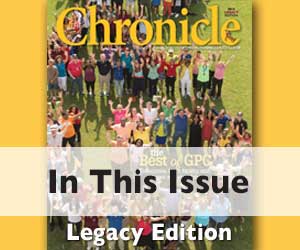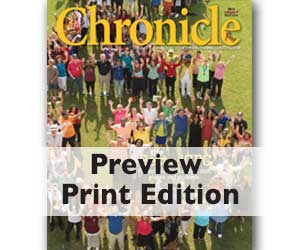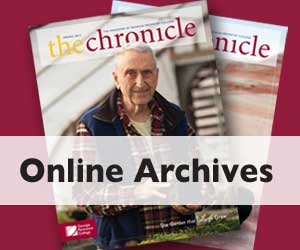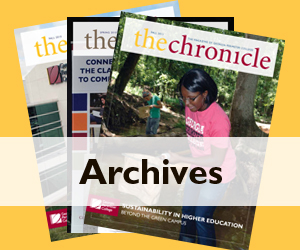
A grant from the Marcus Foundation is making it possible to increase the presence of military student advocates at GPC. From left, Clarkston military outreach center coordinator John Douglas, Dunwoody/Alpharetta advocate Lorretta Arrington, Director of Military Outreach Mark Eister, Decatur advocate Laura Meyer and Newton/Online advocate Nathan Gholston. (photo by Bill Roa)
By Rebecca Rakoczy
Thanks to a generous, three-year grant from The Marcus Foundation, GPC hired three full-time military student advocates to staff the Decatur, Dunwoody/Alpharetta and Newton campuses. The grant also creates numerous additional military scholarships and establishes a Veteran Emergency Fund for students dealing with temporary financial crises. The goal is to help military students stay in school.
In mid-March, GPC Military Outreach Director Mark Eister hired Laura Meyer to serve Decatur Campus; Lorretta Arrington to serve Dunwoody and Alpharetta campuses and Nathan Gholston, for the Newton Campus and GPC Online. The three join Clarkston’s military outreach coordinator John Douglas, who serves Clarkston Campus, as military student advocates.
Here are closer looks at each of the advocates:
Clarkston Campus: John Douglas helps steer veterans to their benefits

John Douglas, center, talks to Jerry Silvio and Liane Levetan, members of the GPC Foundation Board of Trustees. Douglas is military outreach center coordinator on Clarkston Campus. (photo by Bill Roa)
Allen Douglas needed help. The Army veteran and former warrant officer from Lithonia was coming back to school for the first time in 30 years and trying to figure out how his educational veteran’s benefits worked. He learned that the classes he took during a short stint at a North Carolina technical school didn’t count on his college transcript.
That’s where John Douglas came in. John Douglas (no relation to Allen) is a former Army officer who has been working in Georgia Perimeter College’s Clarkston Campus Military Outreach Center as a coordinator for the past year, helping students navigate the veterans benefit system and coordinate their course needs, among other issues.
“I call him the other Douglas,” says Allen Douglas with a laugh. “A lot of guys [veterans] don’t know what their [educational] benefits are, and I now encourage them to go to him—he’ll keep them on track.”
The “other” Douglas, with a career that spanned more than 17 years in the military, is intimately familiar with the needs of veterans from all walks of life. “I was stationed in Germany for six years and was in Kentucky for another six years at Ft. Campbell, Ft. Knox and the ROTC department of the University of Kentucky,” says John Douglas. He served in other roles in ROTC throughout the years and is a graduate of the Airborne and Air Assault Schools and the Command and General Staff College.
Commissioned as a second lieutenant after graduating from the University of North Georgia in Dahlonega, Douglas also has a master’s degree in American Studies from Mercer University.
Now, Douglas lives near Social Circle, and when he’s not assisting veterans and their families on the Clarkston Campus, he works as a public servant for Newton County and the state. Since completing his Army career, he has been elected to the Newton County Board of Education in 1998, the Georgia House of Representatives in 2002, the Georgia Senate in 2004 and the Newton County Board of Commissioners in 2012.
Decatur Campus: Laura Meyer provides a seasoned advisor’s perspective

Laura Meyer, right, enjoys a laugh with Toya Kelly at Decatur Campus. Meyer says she wants to meet students now so they will already know her when they need her. (photo by Bill Roa)
Laura Meyer comes to the military student advocate position as the wife of a Navy veteran—and as a seasoned student advisor at Georgia Perimeter College.
Meyer started working at the college when GPC was still known as DeKalb College. “I was a student affairs counselor in 1996,” she says. “In 2003, I had my second child and quit to stay home for a couple years and then returned in 2007 when my youngest started pre-kindergarten.”
Meyer became a part-time student advisor on the Clarkston Campus for eight years before she was hired this year as the military student advocate for Decatur Campus.
While a student advisor at Clarkston, Meyer says she often saw veterans who didn’t think to identify themselves as such. Today, the college has a “check” button on the admissions site that allows veterans to identify themselves as military. That helps advisors connect them with the right benefits, she says.
“I tell veterans, without identifying themselves as such, they might have missed some opportunities,” Meyers says. “There are certain rules and regulations about using benefits, and I want to make sure they are doing everything they can do to maximum their educational funds.”
Avoiding unnecessary courses is one way to help maximize those benefits, she says. “I am hoping to help these students from application to graduation and be there to help through the whole process,” she says.
She is looking forward to meeting more veterans on campus to tell them about GPC’s military outreach services and opportunities, such as scholarships.
“I like to meet as many of the veterans now when they may not need me, but they’ll know where I am when they do.”
Meyer has a master’s degree in higher education from Florida State University and a bachelor’s degree in criminal justice from Appalachian State University. She lives in Snellville with her husband and two boys. When she is not meeting with student veterans and their families, Meyer enjoys hiking and biking with her family.
Dunwoody Campus: Lorretta Arrington uncovers needs as she reaches out

Lorretta Arrington talks to her son, Ashton J. Simpson, at Dunwoody Campus. Not only was Arrington in the military, but also her son, an Air Force veteran and GPC student. (photo by Bill Roa)
Lorretta Arrington had never been to college when she first stepped onto Georgia Perimeter College’s Clarkston Campus three years ago. A 16-year veteran of the U.S. Army and mother of three, Arrington came to GPC as part of the federal Veterans Retraining Assistance Program.
This May, she graduates from GPC as an Honors student and will continue her studies online at the University of Georgia, where she will major in business administration. She also will continue working at Georgia Perimeter in her role as the Dunwoody military student advocate, advising the 300 student veterans and military-related students n that campus.
“The VRAP program was a government retraining assistance program that was put together due to the recession—there were a lot of veterans that were out of work,” Arrington says.
Arrington was one of the veterans who had lost her business due to the recession. An athlete and marathon runner, she and her husband had owned two fitness centers in Conyers. Both closed. She heard about the federal program and knew it was the right time to go to school. (The federal program ended in March 2014.)
Although it was the first time she had been in college, Arrington became involved with student veterans immediately. She served as president of GPC’s Student Veterans Association and received two scholarships from the Atlanta Vietnam Veterans Business Association and the Military Outreach scholarship.
With her military training behind her and graduation ahead, Arrington embraces the opportunity to continue to work with veterans and their families at GPC.
“Already, I’ve seen the benefit of having an office here and reaching out to these veterans and speaking to them directly,” she says.
Many veteran students are unaware of the benefits they can receive, she says. Many are first-time college students like herself. And while the aim is to help these students toward graduation, sometimes there is more she can do to help them.
“I called a young man and asked him how his classes were going. I found out he had colon cancer; he was ready to undergo surgery and had stopped going to class.”
Arrington knew what to do. She had previously worked as administrative assistant to the dean of academic services at GPC, so “I started the process of hardship withdrawal, since missing classes should be the least of his worries right now,” she says.
The hardship withdrawal is just one example, but many veterans have difficulty adapting to the classroom environment, Arrington says. “A lot of the military [students’] transition is dealing with a younger population that doesn’t have a respect for their country or their professors,” says Arrington. “They [veterans] have seen a lot (in combat situations) and get aggravated when someone is taking advantage of the situation.”
During her career in the Army, Arrington often traveled to restructure offices for new soldiers accepting duties. “Military offices are very uniform, but everyone is different. I would go in and bring the offices back to code for the new assignee.”
She also worked at the Pentagon during Desert Storm. That assignment was sobering, she says.
“I worked in the office where they created death certificates and notified families,” Arrington says. “I walked away with an understanding that these aren’t just military personnel, these are real people, and, while I was going to leave the assignment, that’s where their stories ended.”
Arrington is passionate about helping military veterans and has contacted military students at Dunwoody and Alpharetta campuses to help them get the support they need. She has a particular interest in one of those students—her son is a veteran of the Air Force, and attends GPC Dunwoody.
Newton Campus/Online: Nathan Gholston enjoys giving transition support

Nathan Gholston explains services to Chase Brown. Gholston serves Newton Campus plus military students who take classes online. (photo by Bill Roa)
Nathan Gholston was following a family tradition when he joined the military right after high school.
“My father was a Marine, my uncle was a Marine. My aunts and uncles have all served … . I saw the different things they were able to accomplish, and so I figured I would go ahead and join the military, even though I had the option of attending college at that time,” says Gholston, a former first sergeant who now serves as military student advocate for Georgia Perimeter College’s Newton and Online students.
Gholston joined the U.S. Army and served in Germany two times for a total of six years; He also served at Fort Drum, N.Y.; Fort Campbell, Ky.; Washington D.C.; Fort McPherson, Ga.; Scott Air Force Base, Ill.; and Fort Belvoir, Va. Gholston was trained as a mechanic but eventually retrained as an executive administrative assistant and as an intelligence analyst.
“I completed 26 and a half years in the Army,” he says. “I joke, ‘I did my four, can’t do anymore.’ I went to Iraq twice and went to Turkey to support Operation Northern Watch, back in 1998 under the first [President George H.W.] Bush.”
Gholston ended his military career at Fort Belvoir, as an intelligence analyst and came to Georgia to be near his brother and close family members. He lives in Gwinnett County.
Gholston is no stranger to academic life. He took advantage of using military Tuition Assistance (TA), which is available to active duty service members. He completed a bachelor’s degree in psychology and started on his master’s degree while serving in the military and was selected to the dean’s list, national dean’s list, Phi Theta Kappa Honor Society, and Phi Beta Sigma Incorporated.
“I strived to show my kids they could accomplish anything they set their minds to do” says Gholston.
He looks forward to providing assistance and support to the more than 200 veterans and military students who attend the Newton Campus, as well as military students who take online courses.
“That’s what interested me most about this job,” Gholston says, “the opportunity to remain connected to and support veterans who are transitioning from the military and getting started with classes for the first time, or starting over again in college.”
When he’s not listening to or advising veterans, Gholston enjoys playing and raising his 5-year-old grandson, who lives with him. “I have two stepdaughters in college; I have three older children from a previous marriage who are all grown, and three grandchildren, one of whom stays with me.”
Check out this issue’s other articles about military and veteran students and GPC’s outreach services:
Easing the Transition for Military Students
Mark Eister: Supporting Service Members
Marcus Foundation Grant Will Help GPC Serve More Student Veterans







No Comments on “Military Advocates Bring Understanding to their Role”